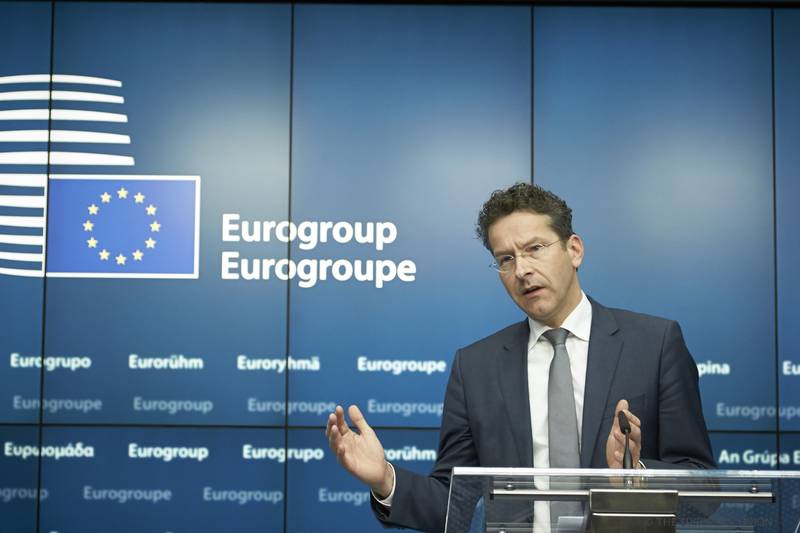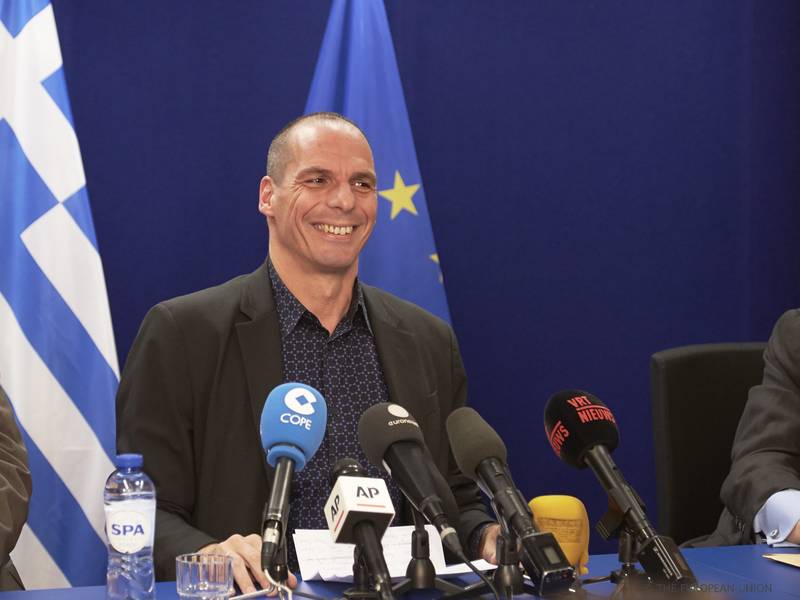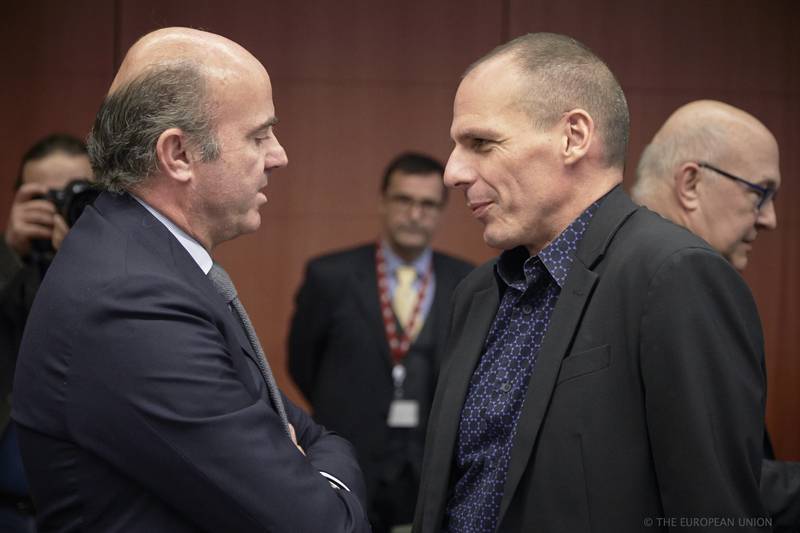Eurogroup: Greece Is Wasting Time
Adelina Marini, March 11, 2015
 When the Eurogroup chief and minister of finance of the Netherlands, Jeroen Dijsselbloem, said last month that the implementation of the 20 February agreement with Greece would not be easy he was extremely right. Difficult because Greece focuses mainly on the packing (for its electorate), whereas the Eurogroup expects specific actions and results. This time too, just like with previous meetings, the clash was mainly on how to name things - with their true names or to choose names that would be as close as possible to the unrealistic election promises. Mr Dijsselbloem, though, as many other members of the Eurogroup, has begun losing patience. "We're losing too much time", the Dutch finance minister said, specifying that it is being discussed how to call what and by whom instead of moving on to more specific actions. Since the last meeting not much has been done and the clock is ticking. After all, the extension of the bailout programme is only four months, he recalled before and after the otherwise brief meeting on 9 March.
When the Eurogroup chief and minister of finance of the Netherlands, Jeroen Dijsselbloem, said last month that the implementation of the 20 February agreement with Greece would not be easy he was extremely right. Difficult because Greece focuses mainly on the packing (for its electorate), whereas the Eurogroup expects specific actions and results. This time too, just like with previous meetings, the clash was mainly on how to name things - with their true names or to choose names that would be as close as possible to the unrealistic election promises. Mr Dijsselbloem, though, as many other members of the Eurogroup, has begun losing patience. "We're losing too much time", the Dutch finance minister said, specifying that it is being discussed how to call what and by whom instead of moving on to more specific actions. Since the last meeting not much has been done and the clock is ticking. After all, the extension of the bailout programme is only four months, he recalled before and after the otherwise brief meeting on 9 March.
The lack of patience was the strongest before the beginning of the meeting when a majority of ministers, who spoke to the journalists in front of the Council building in Brussels, used the word "Troika". One of the "fundamentals" of the 20 February agreement, though not a formal one, was the consensus to never again use the odious word "troika". This is the nickname of the three institutions involved in the monitoring of the implementation of the bailout programme - the European Commission, the European Central Bank and the International Monetary Fund. Those are also the institutions that lent low interest rate loans to sustain Greece's life, which is still incapable to return to the capital markets because of unbearable debt prices formed by the complete lack of trust in the government's capacity to restore stability and sustainability.
Lost in translation
Economic and financial affairs Commissioner Pierre Moscovici, however, insisted on the troika word. Generally, those who restarted using the forbidden word were those who expected of Greece more, but, again, there was disappointment. The Eurogroup expects the institutions/Troika to start work immediately to enable the completion of the review of the implementation of the promised reforms which, for its part, to lead to the release of the last tranches of the agreed loans - a little over 7 billion euros. All this in a situation where Greece will very soon will have no money to pay its debts or its obligations under the budget. The Greek government, for its part, insisted the Eurogroup to approve the proposed reforms which is the job of the three institutions.
Before the beginning of the meeting, Finance Minster Varoufakis sent a letter to the Eurogroup chief, Dijsselbloem, in which he describes seven reforms among which in the area of taxation, public administration, the humanitarian crisis. In his letter, Mr Varoufakis demanded also the technical talks not to take place in Athens but elsewhere. Jeroen Dijsselbloem, however, disagreed because a majority of ministers want the representatives of the Troika to have access to the books of the Greek government to make sure that there will be no deviation from what it says and what it actually does. In the end of the meeting it was agreed the negotiations to begin today (Wednesday) in Brussels but the representatives of the institutions to be allowed in Athens as well. Everyone were unanimous that what Greece needs to do is to implement its commitments.
Malta's Minister of Finance Edward Scicluna said that he expected a stronger commitment by Greece not specific reforms. Commissioner Moscovici, too, underscored that the main thing is to respect the commitments made on 20 February. "The more they speculate the worse it will be for them and for us", said Slovakia's Minister of Finance Peter Kazimir. The only thing that matters is the practical implementation of commitments, added Vice President Valdis Dombrovskis. We should be responsible and constructive not only to our own nations but also to our colleagues in the eurozone and the EU at large, added Lithuania's minister Rimantas Sadzius.
 Yanis Varoufakis, however, was of different opinion. At the press conference after the Eurogroup meeting on Monday evening, which passed almost entirely in English, he said that on Wednesday morning the technical discussions would begin between the Greek team and the representatives of the institutions. "I'm quite happy that some colleagues in the Eurogroup, through inertia, utilise words as troika. If they want the troika and miss it so much we can send it to them, but we are not having it in Greece again", he proclaimed in the very beginning of the briefing. Explained that Greece, too, was part of these institutions and that was why Athens would continue to maintain very close relations with them. What Greece does not accept, however, is the behaviour of the Troika - "cabals of techocrats from the three institutions in lockstep walking into our ministries and trying to implement programme which has failed, at least in the estimation of our government and, I think, of our people. That is a thing of the past", Yanis Varoufakis said.
Yanis Varoufakis, however, was of different opinion. At the press conference after the Eurogroup meeting on Monday evening, which passed almost entirely in English, he said that on Wednesday morning the technical discussions would begin between the Greek team and the representatives of the institutions. "I'm quite happy that some colleagues in the Eurogroup, through inertia, utilise words as troika. If they want the troika and miss it so much we can send it to them, but we are not having it in Greece again", he proclaimed in the very beginning of the briefing. Explained that Greece, too, was part of these institutions and that was why Athens would continue to maintain very close relations with them. What Greece does not accept, however, is the behaviour of the Troika - "cabals of techocrats from the three institutions in lockstep walking into our ministries and trying to implement programme which has failed, at least in the estimation of our government and, I think, of our people. That is a thing of the past", Yanis Varoufakis said.
He promised, however, that the representatives of the institutions will be provided with all the necessary documentation. "Greece is a highly hospitable country", Varoufakis added in his typical verbiage and slightly arrogant style, emphasising that an end was put to the power play of the Troika.
The third in a row clash of comprehension between the Eurogroup and Greece escalated in accusations against the media. The Greek finance minister accused a number of times not one or two western media of poor journalistic standards for distorting facts. The biggest accusation was to the Italian daily Corriere della Sera which, according to Varoufakis, chose deliberately a misleading headline of the interview [in Italian] with him saying that Greece intends to put on a referendum the reforms programme. He admitted, however, that he said that in response to a hypothetical question what would happen if all his reforms were rejected. He said that, then, new elections will have to take place or the programme should be voted in a referendum.
He also blamed the journalists for writing that Greece presented a list of only seven reforms while, in fact, those were only part of the measures Athens plans. The Greek finance minister was not very happy to respond to questions related to the depletion of the government's financial resources either. Asked by Peter Spiegel from The Financial Times on the issue, Varoufakis said: "I'm deeply touched by your concern about the liquidity position of the government". The Eurogroup chief, for his part, said that no money will be released before the completion of the programme review.
 Is the Greek government made of linguists or of politicians, journalists from the German political weekly Der Spiegel asked Greek Prime Minister Alexis Tsipras in an interview. According to him, it is not about terminology. "Every country in Europe has to work together with these institutions. But that is something very different than a troika that is beholden to nobody. Its officials came to Greece to strictly monitor us. Now, we are again speaking directly with the institutions. Europe has become more democratic because of this change", Mr Tsipras said without elaborating, however, what stopped a number of Greek governments from discussing reforms and their consequences with the Troika. For his part, Jeroen Dijsselbloem again recalled that changes to the programme are possible but not in its philosophy.
Is the Greek government made of linguists or of politicians, journalists from the German political weekly Der Spiegel asked Greek Prime Minister Alexis Tsipras in an interview. According to him, it is not about terminology. "Every country in Europe has to work together with these institutions. But that is something very different than a troika that is beholden to nobody. Its officials came to Greece to strictly monitor us. Now, we are again speaking directly with the institutions. Europe has become more democratic because of this change", Mr Tsipras said without elaborating, however, what stopped a number of Greek governments from discussing reforms and their consequences with the Troika. For his part, Jeroen Dijsselbloem again recalled that changes to the programme are possible but not in its philosophy.
In the meantime, new threats came from Athens. Minister of Defence Panos Kammenos threatened that Greece would open its borders for refugees, including jihadists, if the eurozone does not withdraw its demands for austerity. He threatened more specifically Germany, saying that if Europe leaves Greece in the crisis millions of economic migrants and even jihadists from ISIL will receive papers to Berlin. All this forebodes even tougher negotiations not only with the three institutions but also on the demanded by Athens contract for growth that is to replace the existing bailout programmes. The biggest problem, however, does not stem from the threats but from the fact that the two sides speak completely different languages. One speaks the language of populism while the other - the language of realism.
 Klaus Regling | © Council of the EU
Klaus Regling | © Council of the EU Mario Centeno | © Council of the EU
Mario Centeno | © Council of the EU Mario Centeno | © Council of the EU
Mario Centeno | © Council of the EU